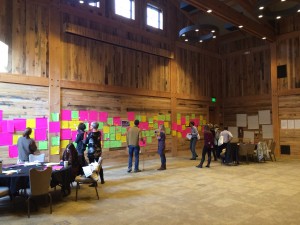 This week, we’re sharing reflections on the Summit at Sundance process and on the ideas leaders in the Chief Executive Program: Community and Culture worked on during this Summit last month. We encourage you to add your voice, questions and experiences to the conversation, and to use the information and conversations to inform action!
This week, we’re sharing reflections on the Summit at Sundance process and on the ideas leaders in the Chief Executive Program: Community and Culture worked on during this Summit last month. We encourage you to add your voice, questions and experiences to the conversation, and to use the information and conversations to inform action!
How might we, as leaders in the cultural sector, be critical, formative drivers of building the vision for a new economy?(‘New Economy’ refers not to the high-tech economy, but a reconsideration of what the purpose of the global economy is, defining it more broadly to include issues of political and social justice, environmental sustainability and broader measures of wellbeing.)
As austerity programs have been adopted by many nations in the wake of the 2008 financial crisis, leaders in many fields have asked whether our definitions of economic performance shouldn’t be broader than measures that are only financial (e.g., GDP). This includes cultural leaders, many (but not all) of who have a more expansive view of ‘success’ and ‘wellbeing’ than can be captured by financial metrics alone, whether for themselves or their organizations. This is unsurprising given they have chosen to work in a sector where it is the exception rather than the rule to define success only in financial terms.
In our preparatory conference calls and at Sundance, there was considerable agreement that a more expansive definition of what constitutes a successful economy is warranted; there was rather more divergent thought on whether effecting this sort of change is realistic given their resources and competing priorities. From dozens of possible answers to this question, a few emerged as particularly galvanizing for those present, including me. It took different forms, but each related to the notion that the wider economy and arts & culture would mutually benefit from closer connections. We imagined leaders, creative entrepreneurs of all kinds (regardless of tax status), working with an increased awareness of the social, governmental and economic contexts in which they work. I found this particularly exciting because it stands in stark opposition to one of the more frustrating dynamics often seen in our field: a failure to more fully engage with all sectors of our communities unless an ‘arts issue’ is at stake and a too frequent tendency to subdivide our field into smaller and smaller groups, at times muting our voices and impact when they are most needed. Hearing these discussions at Sundance, my hopes for the field – and a better definition of a new economy – were buoyed. I am reminded of Theaster Gates’ words at an event in Chicago earlier this year: ‘Art can no longer afford to be concerned only with itself.’

Leave a Reply